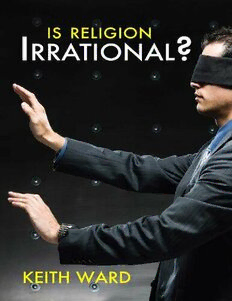
Is Religion Irrational? PDF
Preview Is Religion Irrational?
A CD set of Oxford-tutorial type talks by Keith Ward, based on the material in this book, will be available in the Autumn, 2011. Titled Why I am not an Atheist, it is produced by “the Invisible College”, available from retail outlets and online. IS RELIGION IRRATIONAL? KEITH WARD Copyright © 2011 Keith Ward This edition copyright © 2011 Lion Hudson The author asserts the moral right to be identified as the author of this work A Lion Book an imprint of Lion Hudson plc Wilkinson House, Jordan Hill Road, Oxford OX2 8DR, England www.lionhudson.com ISBN 978 0 7459 5540 7 (print) ISBN 978 0 7459 5952 8 (e-pub) ISBN 978 0 7459 5951 1 (Kindle) ISBN 978 0 7459 5953 5 (pdf) First edition 2011 10 9 8 7 6 5 4 3 2 1 0 First electronic format 2011 All rights reserved Acknowledgments Scripture quotations taken from the New Revised Standard Version published by HarperCollins Publishers, copyright © 1989 by the Division of Christian Education of the National Council of the Churches of Christ in the USA, and are used by permission. All rights reserved. Cover: Mike Kemp/Rubberball/Corbis A catalogue record for this book is available from the British Library Contents Title Page Copyright 1. Why Does Belief in God Matter? 2. What is God? 3. Does God Cause Evil? 4. Is the Universe Intelligently Designed? 5. The Sense of Transcendence 6. Is God Free? 7. Are Faith and Reason Incompatible? 8. What is Revelation? 9. How God Acts in the World – A Christian Understanding 10. Is Religion Evil? 11. How Should We Interpret the Bible? 12. What is the Future of Religion? Chapter 1 Why Does Belief in God Matter? In the early twenty-first century atheism seems to have taken on a new lease of life. Buses in London carry the slogan: “There’s probably no God. Now stop worrying and enjoy your life.” A recent Christmas billboard in New York read “You know it’s a myth. This season, celebrate reason!”. In the United States and in Britain there seems to be a concerted campaign to persuade people that atheism is the only reasonable form of belief. It is propagated by a group who call themselves the “Brights”, leaving believers in God to be, presumably, the “Dims”. Its best-known evangelists are Richard Dawkins, Christopher Hitchens, Sam Harris, and Daniel Dennett, though there are many others too. This new atheist movement is not, however, based on a call for toleration of atheism as one worldview among others. It is, as one reviewer of Harris’s book The End of Faith put it, “A radical attack on the most sacred of liberal precepts – the notion of tolerance… an eminently sensible rallying cry for a more ruthless secularisation of society.” Religion is not to be tolerated. It is to be exterminated. The last time such words were widely heard was in Soviet Russia where, as the Russian theorist Bakunin put it, “The religious are to be exterminated as social reactionaries”, and where tens of thousands of priests, monks, and nuns were tortured, shot, or exiled to Siberia. Similar oppression has taken place in Communist China. It is more than a little ironic that atheist writers should criticize religion for its intolerance when they themselves, or at least some of them, have no time for toleration of views with which they disagree. But is religion really so dangerous that it must be stamped out? Is it really so stupid that no reasonable person could believe in God? These are the questions I shall be dealing with in this book. I may have begun rather polemically, but the polemics are not mine. They are the polemics of a new and aggressive atheism. I want to proceed less polemically, by what I hope will be a dispassionate and reasonable analysis of the arguments that rage around the basic ideas of religion – ideas of God, the soul, freedom, and immortality. I am a philosopher and theologian, so my chief interest is in the beliefs that are central to religion, in the meaning of those beliefs, and in the
